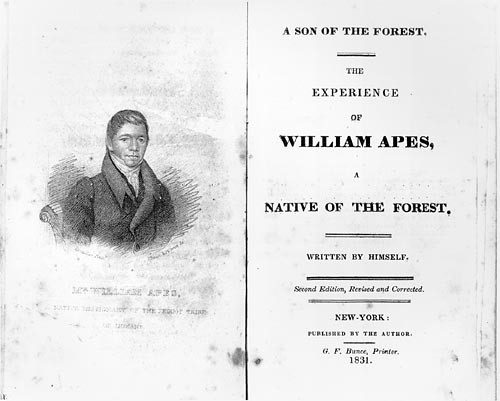
and Lopenzina, Through an Indian's Looking-Glass: A Cultural Biography of William Apess, Pequot. For more on Apes see O'Connell, On Our Own Ground. Harassed by creditors, for several years, however, Apes moved to New York City, where he died in 1839. Through his publications, Apes became a popular but controversial public speaker. He later wrote of the event in Indian Nullification of the Unconstitutional Laws of Massachusetts Relative to the Marshpee Tribe, which included a critical evaluation of white society. Immersed in the political struggles there, he participated in a local protest over wood rights, was arrested and briefly jailed. Later that year, Apes removed to Cape Cod in Massachusetts where he worked among the Mashpee.

Two years later, he directed his religious ministry to his own Pequot community in Ledyard, Connecticut and in 1833 published The Experiences of Five Christian Indians of the Pequot Tribe. In 1829, he published the story of his life in A Son of the Forest. Licensed by the Methodists, Apes became an itinerate minister mainly within the Southern New England-Hudson Valley corridor. The couple would go on to have several children: William B., Solomon, Leonard, Abby Ann, Sally George, Abigail, and possibly Lyman E. He married Mary Wood of Salem, Connecticut on December 12, 1821. By early summer of 1817, Apes returned to Connecticut where he followed a vocation to religious life. After his term expired in 1815, he traveled around Canada, working as a day laborer and visiting Indigenous communities in Eastern Ontario. When he was 15, Apes ran away to join a New York militia unit as a drummer and served on the Northern Front during the War of 1812. A son of the forest (1970 edition) Open Library It looks like youre offline.

As a young boy, he was removed from his grandparents' care and raised as an indentured servant in several white households in New London County. A son of the forest by William Apess, 1970, Apes edition, Microform in English - 2nd ed., revised and corrected. When Apes was young, his family removed closer to their ancestral Mohegan and Pequot communities in southeastern Connecticut. In that volume, he described himself as being black, white, and Indian. William Apes, the son of William and Candace Apes of Colrain, Massachusetts, was a minister, orator, and author of the first full-length autobiography by a Native person.


 0 kommentar(er)
0 kommentar(er)
